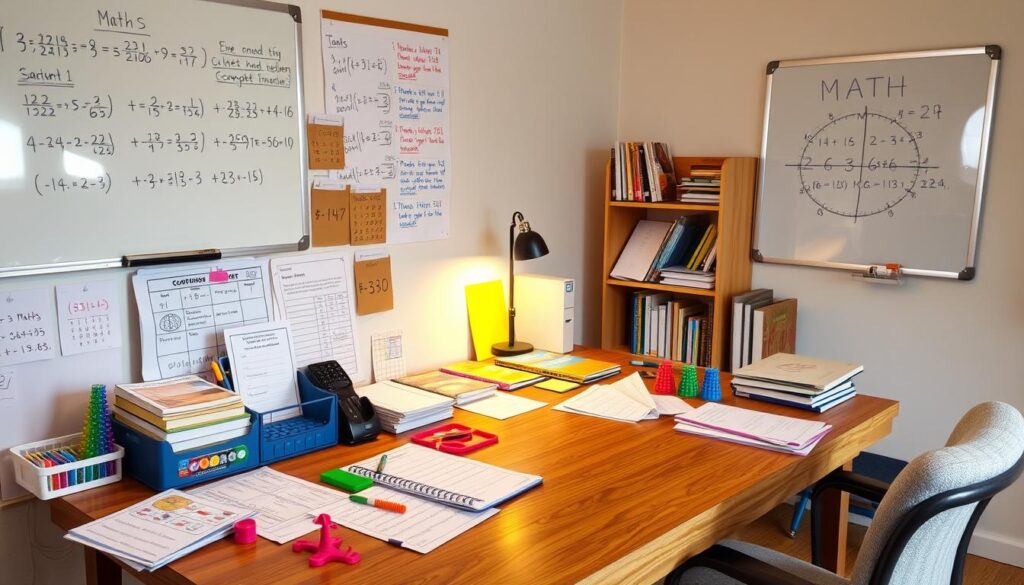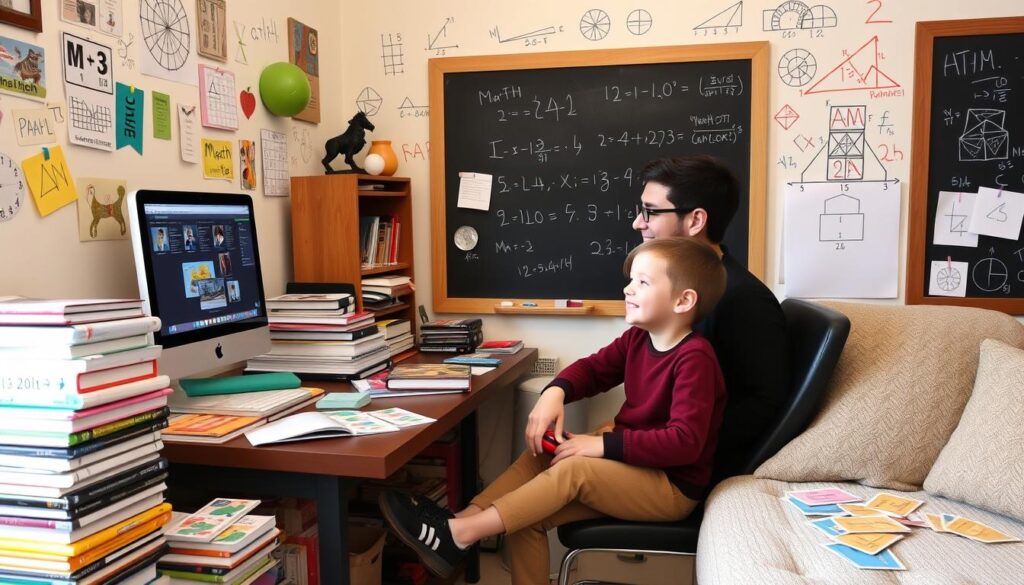As a parent, you want your child to do well in math. But, it can be hard to know where to begin. Can you really help your child with their math homework? You’re about to learn how to support your child’s math education.
Key Takeaways
- Understanding your role in math homework support is key to your child’s success
- Setting up a good homework routine helps your child stay on track
- Creating a positive math environment makes learning fun
- Knowing how to help your child with math homework boosts your confidence
- There’s help available for parents, and you can make a real difference
- Supporting your child’s math education is a journey that needs patience and dedication
Understanding Your Role in Math Homework Support
As a parent, knowing how to help with math homework is key. It’s important to learn tips for parents helping with math homework and strategies for parents assisting with math homework. This way, you can help your child feel more confident in math.
First, understand your role in supporting your child’s math education. This means knowing how to help and setting realistic goals. Here are a few ways to do this:
- Make a special study area that helps your child focus
- Find a homework schedule that fits your child’s life
- Talk openly about any math problems your child faces
Also, creating a positive math environment is key. This can be done by:
https://www.youtube.com/watch?v=uoanfdOIEho
By using these tips for parents helping with math homework and strategies for parents assisting with math homework, you can help your child succeed. Be flexible and adjust your help to fit your child’s needs. Always be ready to offer guidance and support.
Establishing an Effective Homework Routine
To help your child succeed in math, setting up a good homework routine is key. This means having a specific time and place for homework, avoiding distractions, and giving parental guidance for math homework when it’s needed. This helps your child learn good study habits and work ethic.
As a parent, you’re important in supporting your child’s math homework. Create a quiet, comfy study area without distractions. Be ready to answer questions and guide them. Also, talk to your child’s teacher to stay in sync.
Here are some tips for a good homework routine:
- Set a regular homework schedule
- Make a dedicated study space
- Turn off TVs and gadgets to avoid distractions
- Offer guidance and support when needed
By using these tips and giving parental guidance for math homework, you can help your child build a strong math foundation. Also, be there to answer questions and offer help when they need it.

“Establishing an effective homework routine is key for your child’s math success. By giving guidance and support, you help them develop good study habits and a strong work ethic.”
| Homework Routine Tips | Description |
|---|---|
| Set a regular schedule | Help your child set a regular homework schedule for consistency and accountability. |
| Create a dedicated study space | Choose a quiet, comfy spot for studying that’s free from distractions. |
| Minimize distractions | Turn off TVs and gadgets to help your child focus better. |
Creating the Perfect Math Study Space
As a parent, you’re key in helping your child do well in math. One way is by setting up a great study space. This area should help your child focus, stay motivated, and be productive. It’s where they can follow your math homework tips and develop good study habits.
It’s important to find the right balance when helping with math homework. Start by setting up a study area with everything your child needs, like pencils and a calculator. This keeps them organized and focused, reducing distractions.
Essential Supplies and Resources
- Pencils, pens, and pencils cases
- Math textbooks and workbooks
- A calculator and other math tools
- A comfortable and ergonomic chair and desk
Having these supplies and resources can help your child love math more. Make sure their study space meets their needs and preferences. This will make them feel more comfortable and eager to learn.
Minimizing Distractions
To reduce distractions, create a quiet study space away from TVs, video games, and social media. Set a regular study schedule and ask family members to respect your child’s study time. This ensures they can focus on their math homework without interruptions.
How to Help Your Child with Math Homework: Tips for Parents
Helping your child with math homework can be tough, even if you don’t know much about it. To offer good math homework help for parents, first review the homework with your child. Then, find out where they need help and guide them as needed.
Some ways to assist your child include making a quiet study area. Also, reduce distractions and encourage them to ask for help when needed. Online tools and educational apps can also help with their learning.
Here are more tips to support your child’s math education:
- Encourage your child to read math problems carefully and understand them
- Help them break down hard problems into simpler steps
- Encourage the use of visual aids like diagrams and charts to grasp math concepts

By following these tips and supporting your child, you can help them build a strong math foundation. Be patient and encouraging. If they struggle with a concept, don’t hesitate to get more help.
| Math Concept | Online Resources |
|---|---|
| Algebra | Khan Academy, Mathway |
| Geometry | GeoGebra, Math Open Reference |
Understanding Different Learning Styles in Mathematics
Every child learns in their own way, and knowing how they learn is key. By understanding how your child takes in information, you can help them with math homework better. This makes learning math fun and effective.
There are three main ways to learn math: visual, auditory, and kinesthetic. Knowing which one your child prefers helps you guide them. This way, they can understand and remember math concepts better.
Visual Learners
Visual learners love pictures and diagrams. Use graphs, charts, and images to help your child understand math.
Auditory Learners
Auditory learners get math through sound. Reading math problems out loud or using songs can help them grasp concepts.
Kinesthetic Learners
Kinesthetic learners need to do things to learn. Try math games, puzzles, and experiments to help them understand math hands-on.

By tailoring your help to your child’s learning style, you can greatly improve their math skills. Be patient, supportive, and ready to adjust your approach as they grow.
| Learning Style | Characteristics | Support Strategies |
|---|---|---|
| Visual | Learn through images and visual aids | Use graphs, charts, and pictures to illustrate math concepts |
| Auditory | Learn through sound and music | Read math problems aloud, use audio resources, or create songs and rhymes |
| Kinesthetic | Learn through hands-on activities and movement | Engage in math-related games, puzzles, and experiments |
Using Technology and Online Resources
As a parent, you can use technology and online resources to help your child with math. There are many apps, websites, and resources that offer practice, lessons, and feedback. These tools can keep your child interested and help them do better in school. Using technology can make learning more accessible and tailored to your child’s needs.
Some popular online resources for math homework support include:
- Khan Academy
- Mathway
- Coolmath
These websites have interactive lessons, exercises, and feedback to improve math skills. It’s important to set rules for technology use to avoid distractions and ensure effectiveparent involvement in math homework.
Technology and online resources can make learning more fun and supportive for your child. This can help them see math in a positive light and improve their skills. Remember, it’s key to balance technology with traditional learning to give your child a well-rounded education.

- Alignment with your child’s learning style and needs
- Quality and accuracy of content
- Level of interactivity and engagement
By considering these factors, you can pick the best online resources for your child’s math education. This will help reinforceparent involvement in math homework.
| Resource | Description | Benefits |
|---|---|---|
| Khan Academy | Interactive lessons and practice exercises | Personalized learning, real-time feedback |
| Mathway | Step-by-step problem-solving guidance | Improved understanding, increased confidence |
| Coolmath | Interactive math games and puzzles | Engaging, fun learning experience |
Dealing with Math Anxiety and Frustration
As a parent, it’s key to spot math anxiety and frustration in your child. Math anxiety shows up in ways like avoiding homework, putting it off, or feeling less motivated. To tackle this, create a supportive space and encourage a growth mindset.
Supporting your child with math homework is vital to beat math anxiety. Be patient, understanding, and guide them. This helps build their confidence in math. Here are some tips:
- Encourage your child to ask questions and seek help when needed
- Provide positive reinforcement and praise their efforts
- Help your child set realistic goals and celebrate their achievements
Remember, it’s okay to take breaks and focus on your child’s emotional health. This approach helps them see math in a better light, reducing anxiety and frustration.

Working with Teachers and School Support
As a parent, it’s important to work with teachers and school support for your child’s math success. Building a good relationship with your child’s teacher helps you stay updated on their progress. This is key to giving your child the best education.
Effective Communication Strategies
To communicate well with teachers, try these strategies:
- Attend parent-teacher conferences to discuss your child’s progress
- Ask questions and seek clarification on math concepts your child is struggling with
- Share your child’s strengths and weaknesses with the teacher to inform their instruction
By working together, you can create tips for parents helping with math homework that fit your child’s needs.
Understanding Curriculum Requirements
Knowing the curriculum is key for effective support. Learn about the math curriculum and ask the teacher about strategies for parents assisting with math homework that work.

Accessing Additional School Resources
Many schools have extra resources like math tutoring or online support. Ask the teacher about these and how to get them for your child.
Problem-Solving Strategies for Different Math Topics
As a parent, it’s key to know that math topics need different solving strategies. By giving focused support, you can help your child grasp math better. For example, algebra homework might need equations, while geometry might use pictures and spatial thinking.
Here are some math homework tips for parents to remember:
- Encourage your child to break down complex problems into simpler steps
- Help them identify patterns and relationships between different math concepts
- Support their use of visual aids, such as graphs and charts, to help them understand and solve problems
By helping with math homework, you can strengthen your child’s math skills. Be patient and celebrate their wins. This will help them grow in math and problem-solving.
Some key strategies to focus on include:
- Encouraging your child to ask questions and seek help when needed
- Helping them develop a growth mindset and view challenges as opportunities for growth
- Providing opportunities for your child to practice and apply math concepts to real-world problems

By working together, you can help your child understand math better. This will also boost their confidence in solving problems.
| Math Topic | Problem-Solving Strategy |
|---|---|
| Algebra | Use equations and formulas to solve problems |
| Geometry | Use visual aids and spatial reasoning |
Maintaining Patience and Positive Reinforcement
As a parent, it’s key to stay patient and positive when helping with math homework. This helps your child stay motivated and do well in school. Start by celebrating small wins to boost their math confidence.
Patience is vital when helping your child with math homework. Being supportive and encouraging helps them beat math anxiety and grow. Math homework help for parents is also online, giving extra support.
- Celebrate small victories, like solving a tough math problem or getting a good test score.
- Give positive feedback and encouragement, focusing on effort, not just results.
- Set up a rewards system to motivate your child and make homework fun.
By following these tips and staying positive, you can help your child build a strong math foundation. And they’ll love learning for life.
When to Seek Additional Help
As a parent, knowing when your child needs extra help with math homework is key. It can be tough, but with the right strategies for parents assisting with math homework, you can help them. This way, your child can overcome challenges and feel more confident in math.
One effective way to offer parental guidance for math homework is to find out where your child is struggling. You might need to hire a tutor, use online resources, or work with their teacher for extra support.
Some signs your child might need more help include:
- Consistently struggling with a particular concept or topic
- Showing frustration or anxiety when doing math homework
- Needing extra time to complete math assignments
By spotting these signs and getting more help, you can support your child in math. Remember, parental guidance for math homework is vital. It helps your child develop a strong math foundation and boosts their confidence.
Conclusion
Helping your child with math homework is a journey. It requires patience, support, and empowerment. By understanding your role and setting up a homework routine, you lay the groundwork for their success.
It’s important to match your approach to their learning style. Use technology and online resources to help. Also, tackle any math anxiety or frustration they might have.
Keeping a positive attitude and celebrating small wins is vital. It helps build their confidence in math. Work with their teachers and use school resources to support them.
With the right strategies and teamwork, your child can face challenges head-on. They can develop a lasting love for math.
